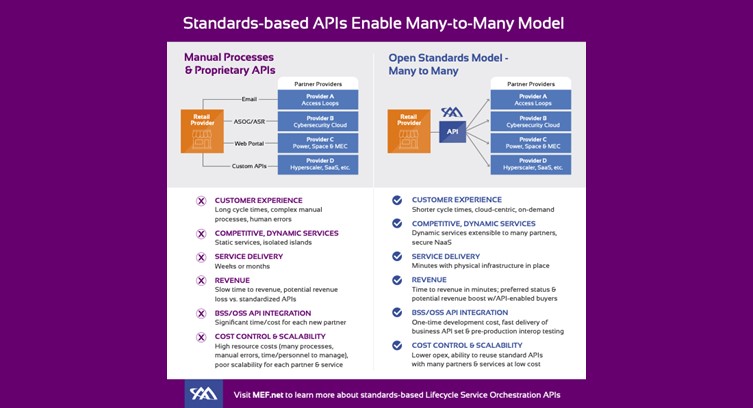MEF yesterday announced it has published 'State of the Industry Report: Paradigm Shift – Automating Business Functions Between Service Providers' one of the industry’s most comprehensive research efforts to date on service automation. The report provides invaluable insight on the industry’s transition towards a fully automated and dynamic service delivery system. This shift is driven by standardized business APIs with high fidelity (e.g., tightly defined context), interoperability, and extensibility that allow service providers to scale efficiently with many partners and services without the need for repeated investment.
MEF’s inaugural State of the Industry report provides in-depth analysis of the current state of service delivery, and explores adoption trends, challenges, and integration with additional new technologies such as blockchain and intent-based networking. The report draws attention to the paradigm shift taking place in the communications industry as more companies embrace automation to streamline their business functions, improve operational efficiency, and accelerate time to revenue. Areas where automation can provide significant benefits are identified within the report, including customer service, billing and settlement, and supply chain management.
Key findings show that service providers implementing standardized business APIs can:
- realize an average 25% reduction in order cycle times
- speed time to revenue for each MEF Lifecycle Service Orchestration (LSO) API-enabled order
- boost revenue opportunities by becoming a preferred partner
- implement multiple LSO APIs in as little as 3-5 months with the help of LSO solution providers
Pascal Menezes, CTO, MEF
Increasingly next-generation services like Network-as-a-Service (NaaS) solutions will be delivered across an ecosystem of many providers, from retail and wholesale service providers, to hyperscalers, to technology solution providers, and so on, and the networks supporting these services will be fully API-driven. For this to happen, standards-based automation is required throughout the entire supply chain where all parties adopt a common, standardized set of APIs at both the business process and operational levels.
Stan Hubbard, Principal Analyst, MEF
Enterprise requirements for cloud-like experiences are driving industry transformation to secure dynamic services across a global ecosystem of automated networks. Secure NaaS platforms, for example, are particularly reflective of this trend as they combine on-demand connectivity, application assurance, cybersecurity, and multi-cloud-based services. MEF research reveals that over 122 service providers worldwide are now in some stage of the LSO adoption lifecycle. With LSO Sonata APIs service providers can transition from manual processes and isolated islands of customized APIs to an open, interoperable standards model that enables plug-and-play reuse of APIs with any partner and service with minimal additional cost and effort.


















